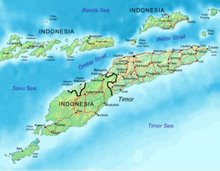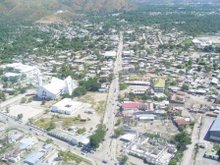
By Seth Mydans
Published: July 11, 2007
DILI, East Timor: It looks like a pleasant place to conduct affairs of state, a broad, palm-fringed compound by the side of the sea with reflecting pools, a rock garden and fluttering flags.
It is the future Foreign Ministry of East Timor, as depicted on a large billboard at the gate of a construction site - and it is a gift from the Chinese government.
Together with a new presidential palace that is also being built by the Chinese, it will be one of the most impressive buildings in this low-rise capital.
The projects are the most visible sign of a growing Chinese presence in this threadbare little country with few natural resources and only marginal geographical advantages to tempt a great power.
China has its hand in a number of areas of Timorese civic life, building barracks and providing uniforms for the country's small military, bringing in medical teams and police, training civil servants and farmers and inviting students and official delegations to Beijing.
"The Chinese government thinks that as good partners, good neighbors and good friends of Timor-Leste, we are obliged to give a helping hand," said the Chinese ambassador, Su Jian, in an interview, using the country's official name.
He noted that China was the first nation to recognize East Timor when it became an independent state in 2002, and added: "The leaders of Timor-Leste regard China like an elder brother and a most reliable friend."
China's friendly stance is part of a broad diplomatic and economic policy throughout the region that has acquired the epithets "soft power" and "charm offensive." Most analysts say East Timor seems to be of interest less as a prize in its own right than as a natural extension of China's energetic courtship of its neighbors in Southeast Asia.
A former Portuguese colony of just one million people, it broke away in 1999 from 24 years of Indonesian occupation and has been struggling to stand on its own feet ever since.
On June 30, East Timor held an acrimonious parliamentary election that will produce a coalition government at a time when a large portion of the country is unemployed, some 20,000 are in need of food aid and 100,000 have been displaced from their homes by a wave of violence last year.
On the hunt for natural resources and working to create a friendly neighborhood as it develops its own economy, China for the past decade has been creating a web of bilateral and multilateral partnerships that bind its neighbors to it.
Reversing a more confrontational policy after the Asian economic crisis of 1997, China plays down any self-interest as it increases trade and aid throughout Southeast Asia.
"In a region where there is a historic fear of China, they are promoting the idea that China is a friendly partner," said Joshua Kurlantzick, the author of a new book called "Charm Offensive: How China's Soft Power Is Transforming the World" (Yale University Press, 2007).
"And they do see these countries as far more strategic than the United States does, and so they are willing to spend resources on them," he said.
In the longer term, some analysts say, China may want to create its own sphere of influence, elbowing aside the United States in the region. Washington's preoccupation today with wars and terrorist threats has left inviting openings for China's advances in Southeast Asia.
"They have been expanding their influence and building their links to governments in a very careful, sophisticated way," said Daljeet Singh, a regional policy analyst with the Institute of Southeast Asian Studies in Singapore.
"They are aware that in the past there was a good deal of suspicion of China and their soft approach is designed to appease, to increase their footprint and their influence through trade agreements, free trade offers, strategic partnerships."
China is the leading trading partner and investor in Myanmar and Cambodia, where it wields considerable political clout. It recently stepped directly into America's sphere of influence with giant projects in the Philippines, including an aqueduct and major highways. It is an increasing presence in Thailand and Indonesia.
East Timor, in its very small way, is part of this picture as China cultivates relationships with the poorer nations of Asia and the Pacific.
Last year, the total import and export volume between the two countries was only $13.6 million, Su, the Chinese ambassador, said.
"China's experience is very rich in helping small and developing countries in Africa," said Su, who has served in four previous Portuguese-speaking postings including Angola and Guinea-Bissau.
"The Chinese government knows exactly what these countries need and also can provide them with very pragmatic skills and technology," he said. "It is very suitable to development of these small countries."
East Timor does have an oil field and its location on sea lanes between Indonesia and Australia could be of interest. The oil is in the Timor Gap, where East Timor and Australia have worked out a formula for sharing revenues.
East Timor's oil money is being held in a government fund for the future in order to avoid the economic disruptions such a windfall can cause, particularly in a country with few institutions or trained people able to put it to good use.
The ambassador said that China's oil giant PetroChina had been given a contract to conduct an onshore seismic survey and that China might become involved in offshore oil field development.
Beyond this, its emerging presence in a country whose dominant players at the moment are Portugal and Australia has caused speculation among local analysts and in the regional press.
The ambassador displayed amusement at the idea that China could have larger ambitions in this area.
"I once talked with Timorese friends about many articles and stories that try to give China strategic interests in Timor-Leste," he said. "When my Timorese friends notice these groundless exaggerations, my Timorese friends all laugh at that."








Sem comentários:
Enviar um comentário